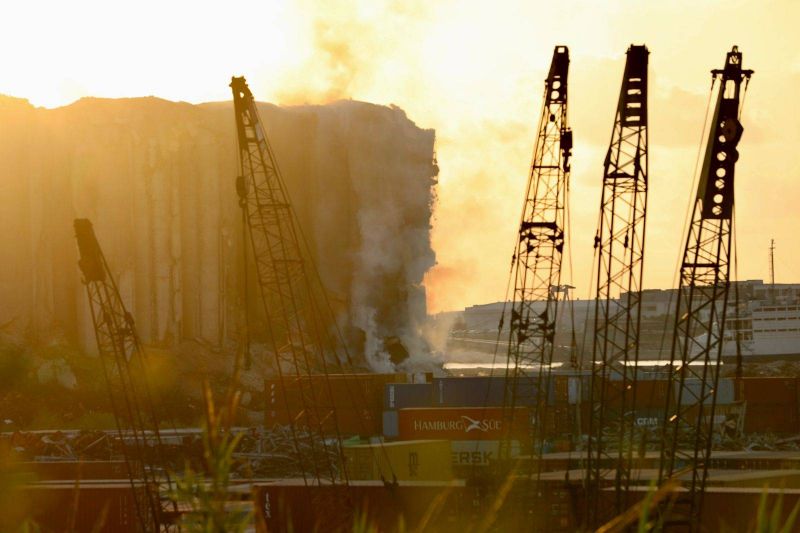
Smoke rises from the Beirut port silo's on June 21. (Credit: Matthieu Karam/L'Orient-le Jour)
Want to get the Morning Brief by email? Click here to sign up.
Parliament is scheduled to convene today for its first legislative session since elections. The body will vote on 40 draft laws and elect seven MPs to the Supreme Council, which is authorized to prosecute members of Parliament and ministers. The draft laws to be voted on encompass education, the economy and banking secrecy, social affairs, reparations, the maritime border, refugees and the upcoming presidential elections. Two proposed laws are relevant to accessing international aid, lifting of banking secrecy to meet the International Monetary Fund’s demands and the approval of a World Bank wheat financing loan. Although the wheat supply in Lebanon was jeopardized by the Russian invasion of Ukraine, from which a significant portion of wheat imports originated, the Ukrainian ambassador to Lebanon on Monday announced measures to allow resumption of wheat exports.
Other draft laws, namely the preservation of the grain silos damaged during the Aug. 4, 2020 Beirut port blast, could potentially be rendered moot as the Health and Environment Ministries issued instructions to mitigate the health risks posed by the “collapse or partial fall” of the structures. The ministries instructed that a 500-meters radius surrounding the port should be evacuated in case of collapse, and that residents of areas close to the structures (including Downtown Beirut, Geitawi, Karantina and Mar Mitr, among others) should wear masks and close their windows. Fires have repeatedly erupted at the port silos in recent weeks. Authorities, citing experts, believe this is because of high temperatures causing the grain surrounding the silos to ignite. On March 16, the cabinet agreed to demolish the silos, although this has been opposed by activists and families of the victims of Aug. 4, who fear that destroying the silos without progress in a legitimate investigation is a step closer to sweeping the events of Aug. 4 under the rug.
Yesterday, caretaker Finance Minister Youssef Khalil asked for one week to study aid proposals to meet public workers’ demands. More than a month into the civil servants strike, its impact is felt through delays in delivering cash assistance and housing loans. “Several proposals have been reviewed, and the minister of finance has requested time to study their costs and financial repercussions,” the Prime Minister’s office reported after placation attempts failed earlier, notably two days before the League of Civil Servants announced the start of their open-ended strike on June 13 to protest their working conditions. The chairman and general manager of the state-owned Housing Bank, Antoine Habib, said Monday that the strike has hindered housing loans’ processes, as applicants are unable to obtain and hence submit the required official documents along with their applications. Similarly, the spokesperson for caretaker Social Affairs Minister Hector Hajjar told L’Orient Today on Monday that the ongoing civil servants’ strike will result in “a few days delay” in payments of cash assistance to Lebanon’s poorest at the beginning of August.
A Saudi businessman was kidnapped Sunday in Baalbeck, northeast Lebanon. The Lebanese Army conducted a search on Monday morning in the Charawne district. The reasons and circumstances of the kidnapping are still unknown, however the army reported that the Saudi native had gone to Baalbeck on Sunday to buy land. The Charawne district was at the center of a manhunt in early June which resulted in the death of one soldier and inflicted injuries on others as the army attempted to apprehend wanted drug dealer Ali Zeaiter, also known as “Abou Salle.” After searching the area Monday, following the kidnapping, the army seized weapons and ammunition.
“If the extraction of oil and gas started [by Israel] in September before Lebanon gets its rights, we are going to a fight and have set a goal and we will act accordingly,” Hezbollah head Hassan Nasrallah said on Monday in a televised interview with Al-Mayadeen. Israel deployed on June 5 a floating production, storage and offloading vessel to the disputed Karish gas field, which is intersected by Line 29 — potentially Lebanon’s official maritime border claim if the draft law to expand Lebanon’s maritime borders from Line 23 is approved in today’s legislative session. Nasrallah also claimed readiness to supply Lebanon with Iranian fuel allegedly capable of supplementing state electricity generation by 10 hours “but the government has to approve.” Tackling the controversy over the arrest of Archbishop Moussa al-Hage at the Naqoura border crossing, Hezbollah’s leader denied his party’s involvement and influence over security forces after accusations that the arrest was politically motivated. Earlier Monday, Lebanese Forces head Samir Geagea described the archbishop’s arrest as one of “various ways” Hezbollah and the Free Patriotic Movement intend to “seize” Lebanon.
In case you missed it, here’s our must-read story from yesterday: "Summer Madness: Your weekly financial news roundup."